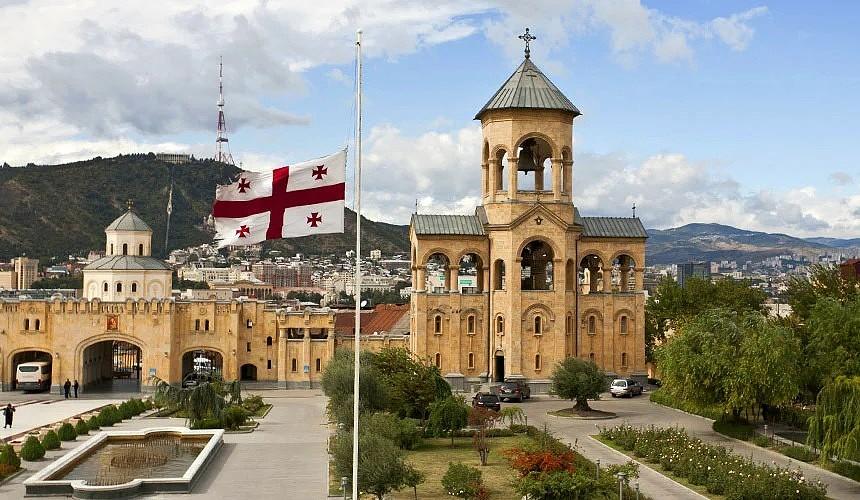"Georgia has always supported the territorial integrity of sovereign states" Georgian political expert on Caliber.Az
An interview of Caliber.Az with Georgian doctor of political sciences, former member of parliament, professor at Tbilisi State University, Gia Jorjoliani.
- An American non-governmental organization has recently published the results of the next survey in Georgia. When asked which of the parties is closest to your political views, 22 per cent of respondents mentioned the ruling party "Georgian Dream - Democratic Georgia", 7 per cent - the largest opposition party "United National Movement". As much as 64 per cent of respondents adheres to the views of neither party. What can you say about this?
- This is nothing new. Confidence in parties has declined worldwide. For example, in France, confidence in the Socialist Party has decreased. Yes, in Georgia, people's trust in the parties is also low. The sociological surveys conducted by various organizations testify to it. Parties were the main tool of political participation in Western democracies, especially after World War II, but after the 1980s, all has changed, and people's trust in political elites decreased. Politics is becoming increasingly neoliberal, especially in post-Soviet countries.
Therefore, this is not about the “United National Movement” (UNM) or the “Georgian Dream”. During elections, they get more votes because other parties have less chance. Although people do not trust these two largest parties, they vote for them despite others. Generally, political parties in the post-Soviet countries are not massive, they do not have a clear ideology or a clear distinction, a worldview platform, and they are more inclined to fight for power.
Today, people are becoming more and more disappointed with the activities of political parties, most of which now talk more about current issues than about the development of the country, and political and economic life. This happens because the division of coalitions on socio-economic fronts, which the political parties of Western democracies used to do, is increasingly fading away, and the parties are more focused not on some specific policy, but on the response of voters, and they try to please everyone.
- What are the main differences between the rule of the “Georgian Dream” and the “UNM”?
- Of course, there are certain differences between the “Georgian Dream” and the “UNM”, but this does not apply to economic and social life. The fact is that in 2012 when the majority of voters voted against the UNM and for the Georgian Dream, they were displeased with the authoritarian and repressive methods that had developed during the rule of Saakashvili's party. Now people are dissatisfied with the fact that the economy in Georgia is in a breakdown, we have a very high unemployment rate. The political elite has already adapted to this - in our country 1 per cent of people live well, 2-3 per cent can be attributed to the middle class, and 90 per cent of citizens are in difficult conditions. About 20 per cent of the population is living in poverty. Therefore, people do not see in these parties those mechanisms that could improve their lives.

- If elections take place in Georgia tomorrow, who will the electorate vote for?
- I think that the Georgian Dream will win after all, since most people have a negative attitude towards the UNM. There are very few new parties. I was the chairman of the “Social Democrats for the Development of Georgia” party, I hold a parliamentary seat twice. But it is complicated when resources for making part of political life are concentrated in a very narrow circle, primarily financial and communication resources. They are leveraged by the circles that represent the ruling authorities. Our party stood for radical change, but we cannot compete with them as the financial and media resources are possessed by these two large groups.
- What is Georgia doing today to return its occupied territories?
- Today, we limit ourselves to explaining our legal positions on various international platforms. We don't have any other options at the moment.

- Will Georgia's desire to join NATO go down after the war in Ukraine?
- I don't think so. In Georgia, on the contrary, pro-Western sentiments have intensified, and radical pro-Russian sentiments have decreased. Time will show all. Perhaps it will not be NATO, but the search for some kind of security guarantees related to Western countries. Trust in Russia is declining.
- What are your predictions regarding the future of the Caucasus region?
- It is very difficult now to make any forecasts. Still, I believe that over time, Russian influence will weaken. Moscow will weaken after the Russo-Ukrainian war, but this will take time. The anti-Russian sentiment is on the rise in Western countries. The Russian economy will weaken even more.
- How do you assess the level of Georgian-Azerbaijani relations?
- Today, our relations are at a fairly high level, over time they will become even more intense, given the weakening of interaction with the Russian economy, local ties will become more significant than global relationships, and in this regard, our cooperation will expand even more.
- What do you think about Baku’s decision on the Karabakh issue?
- Georgia has always supported and will continue to support the territorial integrity of sovereign states. The main thing is resolving all issues peacefully. If we want to develop and continue our history, everyone must come to peace.








